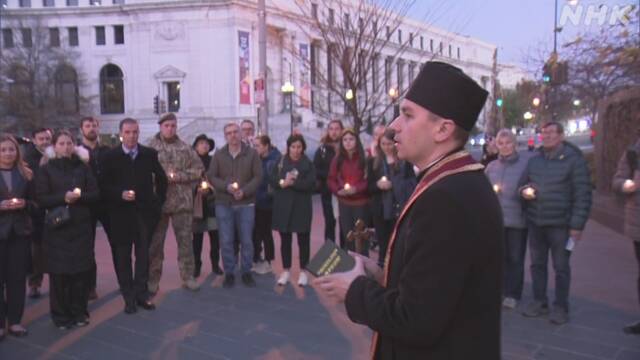On the 26th, Ukraine, where Russia continues to invade, celebrates the day of commemoration for the victims of the great famine caused by the Soviet Union 90 years ago, and public opinion for a thorough resistance against Russia is increasing.
In Ukraine, millions died in a great famine called "Holodomor" from 1932 to 1932, and the victims will be remembered on the 26th.
The Great Famine was blamed on the Stalinist regime in the Soviet Union, and a poll of 1,000 people conducted by a Ukrainian civil society earlier this month found that 93% said they thought the Holodomor was a genocide against Ukrainians. It means that
In Ukraine, many people associate this “Holodomor” with the ongoing military invasion by Russia, and public opinion for a complete resistance to Russia is increasing.
On the other hand, in a statement released on the 25th, the United Nations High Commissioner for Human Rights said that a newborn baby died in a hospital in the southern Zaporizhia Oblast due to a missile attack by the Russian military, etc. At least 77 civilians were killed and 272 injured.
The Holodomor refers to the great famine that struck Ukraine in 1932-1933, killing millions.
In Ukrainian, it means "massacre by hunger", and in Ukraine, it is said that it was a famine that was artificially caused by the Stalin regime of the Soviet Union at the time.
In the background, it is pointed out that the Stalin regime thoroughly confiscated food from the rural areas of Ukraine it ruled while forcibly incorporating farmers into collective farms.
After the collapse of the Soviet Union, the reality gradually became clear, and the Ukrainian government positioned it as a genocide by the Soviets against Ukrainians.
According to the National Museum in Kyiv, the capital city, which conveys the record of "Holodomor", 18 countries such as Europe and the United States have so far recognized genocide over "Holodomor".
On the other hand, the Russian government has denied the perception of genocide, arguing that the famine occurred throughout the Soviet Union.
While saying that the Japanese government is "not in a position to evaluate", it shows the idea that such a tragedy must never be repeated.
The woman who survived the Holodomor...
A 102-year-old woman who survived that time said, "I don't want to live a life filled with fear like I did back then," and appealed for an end to the ongoing military invasion by Russia as soon as possible. I was.
Lyubov Yarosi, 102 years old, lives in Zhytomyr Oblast, northwestern Ukraine.
When he was 12 years old he suffered a great famine.
Yarosi had six siblings, but his sister died of starvation and his brother was beaten to death when a guard found him while trying to pick vegetables in a nearby village.
Yarosi said of the situation at the time, ``We were eating leaves and trying to survive.
One day, he collected some ears of wheat and brought them home, but the guards found them and confiscated them all. He testified that he was under strict surveillance by the Soviet Union.
In Ukraine, many people overlap the ``Holodomor'' 90 years ago with the military invasion by Russia from February this year, and it has been pointed out that it has led to a thorough resistance to Russia.
Since the invasion began, Yarosi's three grandchildren have served in the Ukrainian army and are said to be fighting the Russian army.
Yarosi himself volunteered to help Ukrainian soldiers create clothing that would cover them on the battlefield.
Mr. Yarosi said, "I don't want to live a life full of fear like the former Soviet era."
After that, he looked down and said, "I'm waiting for the news on the radio that the war will end. I want to live until then."
Special exhibition in memory of the Holodomor
In Ukraine, the fourth Saturday of November is a day of remembrance for the victims of the "Holodomor", and various events are held to remember this history.
At the national museum in Kyiv, the capital, a special exhibition of photographs recording the situation at that time is being held as this year marks the 90th anniversary of Holodomor.
Among them, 49 photographs taken by an Austrian man who lived in eastern Kharkiv etc. at that time escaped the surveillance of the authorities, and the cameras used for shooting are displayed.
Among them, the handwritten description "hunger" shows residents passing by a person who has fallen on the side of the road. This indicates that the
Also on display are photographs of the mass graves where the deceased were buried.
Many people in Ukraine associate the Holodomor that occurred in the Soviet era with the current military invasion by Russia.
In an interview with NHK, Minister of Culture and Information Tokachenko, who visited the exhibition hall, said, "Unfortunately, attacks on the Ukrainian state and identity have been repeated in the same way as the Holodomor. It will be a big wake-up call to the world."

